Insider Report Making Steady Moves Towards



In this ever-shifting pandemic, our innovative African Visionary Partners continue to deliver transformative impact. The diversity of their community-driven solutions continues to prove that African visionaries, with their expertise and close proximity to the challenges their communities face, are not objects of charity, but drivers of change. In working with our Visionary Partners to accelerate their impact this first half of the year, we gained an even deeper understanding of their different capabilities and contexts, and will use that to continue to inform how we influence other funders to support African founders.
We believe our partners must be equipped to play the long game, which means investing in them to bolster their core capabilities and financial health, and not just funding their programs. Through our Portfolio Services, our partners articulated their growth goals, and they were able to access organizational development grants for these projects. In the coming year, we aim
to iterate an online application system, which will allow us to reach more local organizations that are doing meaningful work across the continent.

Now, more than ever, we need to do all we can to ensure African visionaries get ample investment to catalyze their collective progress against longerterm, more complex challenges. We are grateful for your support in reducing the racial disparities in philanthropic funding and for committing to build organizational environments that are inclusive and supportive of African visionaries. We could not do this work without you and we thank you.
With gratitude,
Atti Worku CO-CEO Katie Bunten-Wamaru CO-CEO
As an impact catalyst, we measure our success according to the impact and achievements of the Africanled organizations we support, not our own metrics. They are the true heroes of systemic change on the continent. Here are just a few examples of the impact our partners have had in the first half of this year:
• BarefootLaw’s innovative technology solutions and impact stories were showcased at an Access to Justice and Technology panel hosted by the Commonwealth Lawyers Association on June 21, 2022, which was held alongside the biennial Commonwealth Heads of Government Meeting at Kigali, Rwanda.
• As of June 2022, almost 5,000 people have been vaccinated against COVID-19 through both Dandelion Africa’s Medical Center and their Backpack Nurse sites, with community members also being well-informed on the importance of being vaccinated.
• In May 2022, Wezesha Impact conducted the African Coalition for Social Impact (ACSI) enterprise development training workshop. A partnership with vocational institutions and community based organizations, the initiative provided more youth with leadership, entrepreneurship, and employability skills training they need to start and grow their own businesses.
• Rays of Hope trained over 4,153 teachers across 30 primary schools. Over 90% of these schools have extended this training to other teachers at their own cost.

• In 2021-2022, ACADES’ reach included 3 districts, 287 communities, 6,900 farmers (41.5% of whom were female), and 13,296 indirect beneficiaries. Of the farmers reached, 78% of them increased their income, while 52% increased their production.
• Friendship Bench saw a total of 27,572 clients across a total of 16 districts and towns in Zimbabwe. Over 82% of these clients showed a significant decrease in symptoms of depression (based on the Shona Symptoms Questionnaire, a locally validated tool for measuring depression and anxiety).

• Fundi Bots’ Robotics/STEM Training trained over 1,434 students across 20 Ugandan schools, while 660 students were trained directly in Fundi Offices. In addition, 5,293 students were taught using our Enhanced Science Curriculum across 33 schools, while 61 teachers were trained in this curriculum.
• MSICHANA Initiative directly reached 4,360 people (and indirectly reached over 60,000 people) across their different strategic goals and programmatic areas, all under their overall goal of advancing gender equality in Tanzania and empowering young girls.
Over the past years, thousands of conference panel hours, concept papers, and virtual calls have been spent on the topic of centering equity in philanthropy, and for good reason. The development sector has been operating in an inequitable dynamic for too long.
Philanthropy’s allocation of wealth is mainly driven by funders who determine which causes should be prioritized, yet fails to unlock the full range of diverse leaders who are bringing their innovative solutions to the forefront. Traditional mindsets and processes of philanthropy become obstacles to transformative change. In Africa, the barriers for grassroots
organizations have been well documented: less than 5.2% of US foundation giving goes to African-led organizations.

We are missing out on pivotal opportunities that value the indispensable talent of leaders who can drive durable impact in their communities. Between a racial reckoning and a protracted pandemic, we are reminded of the urgent accountability to dissect the core principles by which we work and uproot pervasive, inequitable systems.

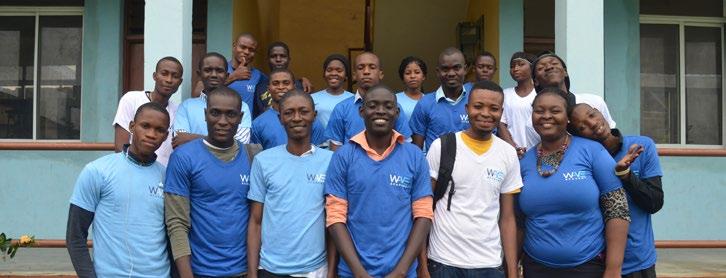

African Visionary Fund’s commitment to equity enabled us to challenge both the sector’s ecosystems of power and our own role as a philanthropic solutions provider. Our two grantmaking rounds allowed us not only to build better relationships with our Visionary Partners, but also to take an inclusive approach on how organizations receive flexible funding.
This entailed re-designing our grantmaking criteria by incorporating diverse perspectives—from our inaugural cohort of Visionary Partners to our Founding Working Group. In our basic eligibility section, we changed our requirements to “African-founded, African-based, and African-led” to address the core disparities organizations face in raising funds. We also adjusted our requirements around growth indicators to accommodate African visionaries in varying stages of their organizational growth.
Through our grantmaking process, we aimed to look at all applications equitably and fairly. We are aware of the biases that we carry, so we make grantmaking decisions by a committee of proximate leaders, our team, and board members to welcome perspectives and challenge assumptions. The makeup of our Grantmaking Committee ensures we bring proximity to the work of the visionaries we are considering and understand the challenges they face.
For our second grantmaking round, we went through a rigorous process over the course of five months— including researching a pool of over 200 referrals and conducting virtual site visits. On December 15, 2021, we announced our new $1.5 million commitment to
support nine innovative African-led organizations. Our Visionary Partners also each have access to $15,000 in flexible organizational development funding for investing in special projects and growth opportunities. In total, we committed to and advocated for 15 Visionary Partners since 2021.
Our commitment to equity also shows up in how we have structured our organization and the daily intention of our team to truly understand our Visionary Partners’ perspectives before coming up with any solutions to support them. It begins with not assuming that we have the best solutions for our partners. Shaping our operations this way helped us gain a collective empathy significantly greater than on our own.
We are working toward piloting an open application system to expand our portfolio’s composition and provide funders a multi-sector pipeline of leaders they can invest in. As we progress further, we are continuously broadening our field of view to support a vast, yet untapped pipeline of African leaders who are making a difference.
There is humility in knowing that inequitable systems do not simply end by aligning our funding models with our values. Breaking the barriers that perpetuate inequity requires us to collectively reflect on the efficient pathways to weave equity across our work—a shift that is long overdue for the sector. On philanthropic giving in Africa, questions surrounding equity have always been asked; now is the time that we answer.
 By Aisha Onsando, Portfolio Manager
By Aisha Onsando, Portfolio Manager
I laughed out loud when I read the first response to our open application system survey which characterized a typical fundraising journey as “usually brutal.” It’s brutal out there and we were interested in all the gory details from their experiences fundraising to their application system wishlist. We sent the survey to current partners and unsuccessful applicants and received (7 partners, 4 applicants).
The key findings were:
1. Most respondents acknowledged the role of global racial inequity in influencing the availability of funding opportunities, and only one respondent asserted that they did not think it was a factor.
2. Organizations are confused, frustrated, and irritated with fundraising in its current form. Most crucially, they feel disempowered and at the mercy of funder whims.
3. Grantee-centric applications need to consider organizational capacity in terms of infrastructure, bandwidth, and competition for resources. The ease and accessibility of applications determine which opportunities the respondents apply for.
4. For all the respondents, a typical funding application journey is about restricted or program funds. This is evidence that there is not enough general support being made available.
5. Our grantmaking is perceived as better, but not perfect in terms of communication of timelines and guidelines. One respondent noted that “Even for AVF, the selection criteria is not clear to us.”
6. Applicants need to feel heard. For them, the worst applications are those that make them feel like they are just throwing information into a silent void.
7. Our partners are interested in using an open application portal to share impact stories and opportunities for fundraising.
In the background of receiving survey responses, it became clear that we would not have time to develop and test a specific African Visionary Fund (AVFund) portal or engage an external designer to help develop the first full version of an open application system. We first needed to figure out a system that is data light, shareable, saveable, and user friendly for both applicants and the AVFund team. Our objective is for the applicant to submit the application and leave with clarity on our selection criteria, values, and timelines for communication. It is also important that the application portal provides applicants multiple opportunities to advocate for their work earlier in the process. One respondent noted that they felt funders just asked for reporting data without creating opportunities for sharing applicants’ excitement, passion, and long-term vision for their work.
As a result, the first iteration of our open application system is a shareable form hosted by Jotform that allows long and short form answers to questions that prompt organizations to advocate for their suitability to our criteria. There will be a mobile version and our hope is that the form circulates widely.
I’d like to express my gratitude to the partners who filled the survey for their candor and for the laughs. I hope they will be equally candid in their evaluations of this round’s application. I am excited to see our progress in iterating an open application system that is truly grantee centered.
Systems change work is challenging, especially when going against deeply entrenched discrimination. For many African visionaries, securing and maintaining funding often feels like a winding road riddled with bureaucratic hoops and hurdles fueled by both conscious and unconscious bias.
Over the past three months, the African Visionary Fund has embarked on an ambitious project to create a systems change advocacy strategy that digs deeper into philanthropy’s broken system, with the intention to share our learnings with other funders within and beyond our networks. We have facilitated key stakeholder interviews with our partners, asking leaders to identify the key problems faced by Africanled organizations when fundraising, and offer solutions on key interventions that funders can begin to implement now to make funding partnerships more equitable, efficient, and effective.
It has been difficult to hear stories of injustice and ignorance as our partners rehash definitive and disheartening moments in their careers: stories of funders asking leaders to reduce the quality of the services they administer, thus dehumanizing their core community of beneficiaries; and stories of funders denying support because of a mismatch in impact measurement frameworks, only for the organization to play a key role in the expansion of the Sustainable Development Goals’ impact metrics later.
Indeed, African leaders are experts at their work, and should be regarded as invaluable partners in solving some of the foremost challenges faced in unique contexts on the continent. Yet hindrances to the health of funder-doer relationships abound, including:

• Mismatches in funders’ grantmaking agenda and the realities on the ground.
• Issues of doubt and mistrust in the expertise of leaders on the ground.
• Pressure to scale too fast without contextual understanding, and
• Dismissals of organizational needs for long-term sustainability.
These are all differences that can be changed and challenges that can be solved with mindset shifts and intentional conversation. If funders were to ask their partners the right questions, there would be more progress towards:
• Making the stewardship and application process less cumbersome.
• Making reporting less unduly monitored, and
• Making philanthropy less prescriptive by transforming grantmaking criteria and giving unrestricted funding.
Equity is at the heart of all that we do at the Fund, and we work hard to be an example of how trustbased partnership and inclusive decision-making can create a new funding model that shifts the power imbalance over time. The AVFund’s relationship with our partners is of utmost importance to us, and we are constantly building and evolving our portfolio services to reflect that. All of our portfolio and grant services are grounded in our partners’ needs – every interaction, email correspondence, site visit, and grantmaking and reporting mechanism is dictated by what works best for them.
We give unrestricted funding because we believe that the people closest to the issues have a better understanding of how to allocate resources towards the solutions. We give them multi-year grants because the socio-economic issues they are trying to solve on the continent are complex and multi-dimensional, and require proximity and patience to see significant social impact over time. Our partners tell us that this
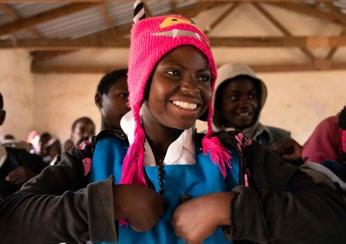
unrestricted and multi-year funding allows them to secure their long-term sustainability and cover the necessary overhead expenses that most funders won’t support. It allows them to innovate and test new solutions that can increase their impact. Everybody wins.


We have also heard our partners express relief that our systems change advocacy strategy is being set in motion, requests for the African Visionary Fund to be even bolder in raising these issues on the global philanthropic agenda, and affirmations that our mission makes a big difference in the way African-founded organizations are funded and treated.
Systems change work is challenging, but it is also tenfold more hopeful. By providing a platform for the most knowledgeable people to share their views, African leaders today and in the future are better enabled to serve and impact their communities. It has illuminated how empowering it is when someone asks the right questions.
Learn more about our work with Visionary Partners.


Our Portfolio Services equip our Visionary Partners with additional funding for special projects apart from their daily administrative needs or programmatic work. In Q4 of 2021, we disbursed five $15,000 grants focused on the core organizational development goals of our first cohort. Here are some ways they are using this organizational development grant to propel their work through the first half of 2022.
“The capacity investment funding from AVFund in 2021 was very beneficial because it has modernized our M&E systems in Village Savings & Loan Associations (VSLAs) and in AGATEKA production. We can now monitor on a daily basis our AGATEKA production as well as the VSLAs without waiting for the weekly reports.”
SaCoDé developed a custom data monitoring software in Kirundi (the local language). The software was designed for their Village Savings and Loan Associations (VSLAs) program, but can also support similar local organizations. They are also setting up customized tools to help them monitor their VSLAs, Human Resources, and AGATEKA production. SaCoDe has been able to set up an online stock management software, making it possible to more efficiently manage the acquisition of materials, their storage, shipment histories in production centers, the management of the production chain, as well as the entry and exit of finished products for the AGATEKA pads.

“All the gaps we identified last year were reduced. Our human resource management has improved; we have a designated person for communication and we redesigned the website. As a leader, I now have time to focus on resource mobilization and strategic leadership of the organization. ”

Rays of Hope invested in growing multiple core capacities of their organization including human resource management and marketing and communications. They identified specific needs in each of these areas and invested in hiring new team members, identifying consultants that could support their specific needs, and redesigning their website to better communicate their impact.
 Photo: Rays of Hope
Photo: SaCoDé
Photo: Rays of Hope
Photo: SaCoDé
+ $1,020,000 additional funds raised making a total of $5.1M toward our $10M goal for 2023
68% 88% 37% of 2022 annual revenue target reached of funding raised is multiyear of funding raised is unrestricted

We

Thank you for generously supporting our mission to drive resources to African visionaries and for believing in their unlimited potential for transformational impact across the continent!


Skoll World Forum Session:
April 8, 2022 – At Skoll Foundation’s Ecosystem Day, our very own co-CEO Atti Worku hosted a free webinar on the opportunities, challenges, and complexities of scaling. Joining her in the discussion were three more leaders from AVFund’s network –Linda Kamau (AkiraChix), Melizsa Mugyenyi (Board Member), and Willie Mpasuka (Rays of Hope) – who shared their insights on when and where scaling strategies work best, how scaling can be redefined to better serve communities, and why viewing scale through an equity lens could help break the status quo. With over 200 registrations and a vibrant Q&A session, the online event revealed a real appetite for such content within the philanthropy and aid communities. Stay tuned for similar sessions from AVFund this year!
Skoll World Forum Session:
April 8, 2022 – Our co-CEO Katie Bunten-Wamaru was a panelist in iDE’s session on the dynamics and impact of trust-based philanthropy at the same Skoll Ecosystem event. Joining co-panelists Shawn Holden Cheung (CEO, Raising The Village), Pete Yao (Chief Impact Officer, Thankyou), and Sheila Leddy (Program Partner, Imago Dei Fund), Katie spoke about what it means to commit to providing organizations with long-term, flexible support on the road to solving global poverty: “I almost want to rebrand trust-based philanthropy sometimes and just call it effective philanthropy. Oftentimes there’s this assumption that funders are the ones to give trust. They have the trust. They have the power. But if you’re truly trust-based, you also have to be trustworthy as a funder. That trust has to be earned both ways.”
May 10, 2022 - Alliance Magazine’s virtual event on redefining the role of philanthropy for the Global North and South featured Atti as one of the panelists. At the event, Atti spoke about AVFund’s mission to connect innovative African leaders with the resources they need to positively impact their communities, as well as our coleadership model and its role in transforming and expanding leadership to be more equitable and avoid unfair power dynamics. Atti laid out how leveling the global playing field means creating new systems of funding, as well as new ways of building the funder-partner relationship on the ground.

September 2022 - Atti was invited to be a judge at the MIT Solve Global Challenges Finals in New York City. MIT Solve’s Global Challenges seek social entrepreneurs who are using technology to solve today’s most pressing problems. Over the past six years, Solve has received 9,600+ solutions from 160 countries. MIT Solve has supported around 228 Solver teams selected over the years, who have collectively impacted over 120 million lives. These teams are 64% women-led and headquartered in 49 different countries.
September 2022 - The AVFund team was invited to New York City for the Clinton Global Initiative (CGI)’s annual Commitment to Action meeting, which brings together changemakers from different backgrounds and issue areas to share their visions for the future, build relationships with other visionaries, and figure out how to achieve tangible, measurable impact in those areas.
September 2022 - Atti will be speaking at the Brazilian Philanthropy Forum’s 4th Annual Conference in São Paulo. The Brazilian Forum of Philanthropists and Social Investors aims to provide an exclusive space for the philanthropic community to reunite, exchange experiences, and learn with peers, enriching the strategic philanthropy in order to promote the Brazilian society’s development. ‘Collaboration’ is the theme of the Brazilian Philanthropy Forum 2022, which aims to show how public organizations, civil society organizations, and individuals can go “fast and far, together”.
October 23-26, 2022 - AVFund is a member of the African Philanthropy Forum and will attend the Annual Meeting in Kigali, Rwanda. The Forum is a strong and vibrant community of partners who, through their strategic giving, investments and influence, foster shared prosperity on the African continent.
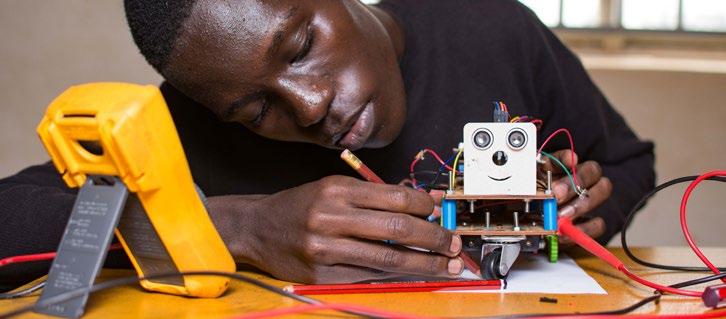
In March, our co-CEO Atti Worku and Portfolio Manager Aisha Onsando visited some of our Visionary Partners in Kenya: AkiraChix, Dandelion Africa, and This-Ability. In May, they also visited BarefootLaw, Kajo Keji Health Training Institute, Fundi Bots, and Wezesha Impact in Uganda. After years of only connecting with our partners online, it was amazing to finally connect with them in person again, and for many partners, for the first time. Seeing how our Visionary Partners do the incredible work they do everyday was a great experience all around and we can’t wait to continue our site visits this summer!
Q&A with Atti Worku & Aisha Onsando
Atti: We approach this aspect of the funder-grantee relationship knowing how traditional power dynamics can arise and affect the work we want to achieve. Disrupting these dynamics during site visits is tricky, as most organizations have a set formula for holding site visits that often have the theme of hosting a visiting dignitary. So we shape the agenda for each of our site visits with the local leaders we are visiting, allowing for an opportunity to reflect on how the visit might work as a learning experience for both their organizations and AVFund. We also intentionally communicate that our visit is not to solely “lend our expertise” or merely “make sure things are on the right track.”
Aisha: It is important to remember that these visits allow us to understand what is happening on the ground in a way that regular updates, reports, or even online communication cannot. Rather than simply evaluating our Visionary Partners according to our own criteria, visits are an opportunity for us to connect with the real context of a situation or project, paving the way for more relevant support.
For example, many of our Visionary Partners are reckoning with ambitious scaling plans while maintaining their team culture, the quality of their services, and their mental health in a world dramatically changed by COVID. They also do these things in some very difficult contexts - from malaria and tuberculosis hotspots to politically sensitive contexts. Our Visionary Partners and the systems that shape their work are so diverse and varied that we need to apply an intersectional power analysis to each organization to adequately disrupt problematic funder-grantee dynamics and ensure we respond to the needs of every Visionary Partner in a way that is informed by them. Site visits are one of the best ways we can ensure that we always know what’s happening on the ground and what our partners are going through.
Aisha: We try to interact with the whole organization even through short and informal conversations. This helps communicate that they are key players in the funding relationship and that we support the passionate and focused leaders at every level, not just the founders or heads of organizations.
Atti: As we continue working with local visionaries, the way we do site visits will be refined to ensure it fulfills our goals to be as just and equitable as possible in everything we do. We hope that the learnings we gain will help shape how philanthropic organizations around the world do site visits and interact with their grantees.

Sibabalwe Mona, our new part time Systems Change Strategist, recently helped us embark on an ambitious project to create a systems change advocacy strategy that digs into philanthropy’s broken system (See “What does systems change mean?”, page [x]). It is our intention to share our learnings with other funders within and beyond our networks.
» We hired Sibabalwe Mona, a strategy consultant for enterprises that focus on the socio-economic development of Africa and its vast diaspora, as our part time Systems Change Strategist.


• As Systems Change Strategist, Siba supports the African Visionary Fund with our advocacy and systems change work. In her role, she merges creative prowess and academic scholarship to enable visionary impact ideas towards systemic change. Her diverse experience with global clients includes business model development, creative communications strategy, project management, and event production.
» We would also like to welcome Isatta Coomber, a digital marketer with experience in content creation, strategy and operations, as our new part time Communications Coordinator.
• In her role, Isatta will utilize her experience in content creation, strategy and operations, as well as her passion for building digital communities and making complex concepts palatable to any audience. As an African descendant, she takes pride in zooming in on the continent that birthed her parents and ancestors and bringing the African Visionary Fund’s narratives to life.
AVFund’s two new board members bring considerable knowledge and experience to our efforts to drive equitable funding and support to African visionaries and advocate for more just philanthropy.
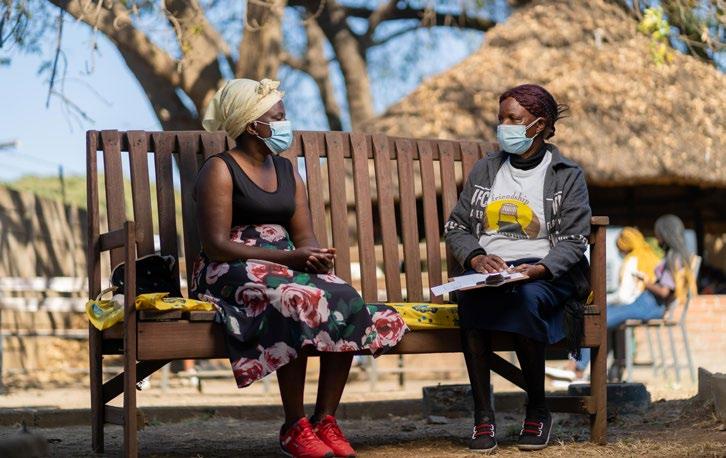

Dr. Suzy Puplampu, DBA, FCCA, ACSI, a lecturer at the Ghana Investment and Securities Institute and mentor for students at Ashesi University, is currently the CEO and Wealth Manager at OctaneDC Limited, a fund management and investment advisory company licensed in Ghana.
Milton Speid, an expert social impact advisor and keynote speaker, currently guides and supports members of The ImPact, a group of visionary families committed to aligning their assets with their values. He was responsible for executing the “Beyond the Bay” and Eastern Region strategies that sought to reinforce Silicon Valley Community Foundation’s role as a global social enterprise and the premier philanthropic partner for charitablyminded individuals and corporations.
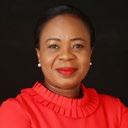

The Aspen Ideas Festival Fellows are a diverse group of over 200 global leaders who are selected for their work, accomplishments, and ability to transform ideas into action. Our Co-CEOs Atti and Katie were nominated by senior members of the Aspen Institute’s staff, Festival advisors, previous Fellows, and many others within the Aspen Institute’s broad network. This opportunity represented an exciting recognition of AVFund’s contribution to the philanthropy sector from a new international audience. While attending the festival, we greatly expanded our network and explored opportunities to collaborate with the Aspen Institute to amplify African visionaries.
Aside from driving core unrestricted funding to African visionaries, we were also able to help our newest cohort of Visionary Partners bridge gaps in access to resources and professional support relative to their stage of development. We worked with them to identify key organizational development goals and aligned projects to fund through our annual organizational development grants.
• Using an individualized approach, AVFund transformed our capacity support programming to Portfolio Services, which are services and resources designed to bolster our Visionary Partners’ organizational systems by investing in their growth, core capacity needs, and organizational development goals.
• Our Visionary Partners, alongside our co-CEO Atti Worku, have co-designed individually tailored organizational development support & grants that are contextually relevant to their stage of development and specific strategies in fast-tracking their impact and effectiveness.
AVFund is excited to continue our work to accelerate and advance the innovative solutions of African visionaries so they can continue to impact their communities. We believe that with the recognition and investment they deserve, we will see more and more effective, relevant, locally-led systemic change across the continent. Here are our exciting plans and goals for the rest of 2022.
» Continue building our grantmaking portfolio and funding Visionary Partners
• Raise $1-2M in new funding commitments to reach $6M towards our $10M goal by the end of 2022.
• Disburse $1.4M in grants to a total of 23-25 African Visionary Partners (AVPs), including making grant commitments to 8-10 new AVPs through one selection process at the end of the year.
• Visit all six 2020 AVPs from our first grantmaking cohort and a few of our new partners located in the same countries.
• Research and design portfolio management strategy and systems.
• Pilot an Online Application System in 2022 to enable us to expand our pipeline beyond our network of referral partners and diversify AVFund’s pipeline of proximate leaders.
» Continue to develop our governance approach and deepen our Visionary Partners’ participation in grantmaking
• Revise grantmaking criteria and selection process with our Visionary Partners towards more equitable and inclusive pathways for investing in local leaders in different sectors.
• Develop and implement onboarding and performance management system.
• Iterate and launch systems and protocols for project management and internal communications.
• Recruit M&E consultant to begin developing efficient M&E frameworks to measure AVFund’s impact and communicate our African Visionary Partners’ impact.
• Design organizational capacity assessment tool (OCAT) with African Visionary Partners.

• Develop a systems change strategy to engage funders to grow their pipeline of African visionaries and foster equitable funding models.
• Increase AVFund’s visibility in order to use our platform to advocate for our Visionary Partners’ work and promote more equitable funding models.
• Utilize our platform to advocate for our Visionary Partners’ work and promote more equitable funding models.
» Measuring Is an Act of Power: A Call for Pro-Black Measurement and Evaluation
• “None of us has ever seen or fully experienced a truly equitable organization or society; so, how are we to hold to measures that likely have never captured the full picture of impact or even depicted what that full picture could be?”
» Decolonize Data

• “The social sector too often extracts and siloes data from the communities it supposedly serves.”
• “We have to recognize that a higher number does not necessarily indicate transformation… higher reach alone does not equate to impact.”
• “This five-cylinder engine has propelled funders to break through historic barriers to change like funder budget policies, trustee bias for control, and bureaucratic foundation roles and systems, all of which imbalance power in the grantor-grantee partnership.”
• “ What we found is that a significant number of collaboratives have charted a course that differs from traditional philanthropy: they tilt toward equity and justice, field and movement building, leaders of color, and, for some, power sharing. And, perhaps most importantly, they’re capable of much, much more.”
» PHILANTHROPOD - Impact Stories from a Global Community, Season 3 Episode 1 (Evelyn Omala on Building Trust, Funding Local Leaders and Creating Lasting Impact)
• “In our first episode of season 3 we…meet the remarkable Evelyn Omala who is one of the rockstars of the international development sector. Eve shares her upbringing as a backdrop for her passion and explains her roles with Segal Family Foundation and African Visionary Fund.”
» African Philanthropy Forum Podcast Series (Understanding & Addressing the Imbalance in Funding African CSOs)
• Our co-CEO Atti Worku sat down with the African Philanthropy Forum’s Mosun Layode to discuss Understanding & Addressing the Imbalance in Funding African CSOs. Atti shared insights on the under-funding recorded for developmental initiatives on the continent, and the ways that the African Visionary Fund’s grantmaking approach is working to change the behaviors that limit funding to proximate organizations.
» CNBC Africa Feature - How Funders Can Drive More Money to African NGOs
• Interview on CNBC Africa featuring Co-CEO Atti Worku.













 Photo: WAVE
Photo: WAVE
